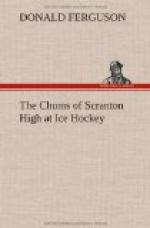“Perhaps,” said Thad a bit wistfully, “you might bequeath me your old skates in case you do get new ones. Mine are not half as good for hockey. I don’t blame Nick for envying you their possession; but then it hasn’t been so much what you had on your feet that has made you the swift hockey player you are, but coolness of judgment, ability to anticipate the moves of the enemy, and a clever stroke that can send the puck skimming over the ice like fury.”
“Here, that’ll do for you, Thad. No bouquets needed, thank you, all the same. According to my notion there are several fellows in Scranton my equals at hockey, and perhaps my superiors. Nick Lang, for instance, if only he had skates he could depend on, and which wouldn’t threaten to trip him up in the midst of an exciting scrimmage.”
“But, see here, Hugh, you were speaking just now about a chap built like Nick turning over a new leaf, and making himself respected in the community in spite of the bad name he’s always had. Honestly now, do you really believe that’s possible? Is there such a thing as the regeneration of a boy who’s been born bad, and always taken delight in doing every sort of mean thing on the calendar? I can’t believe it.”
Hugh Morgan turned and gave his chum a serious look.
“I’ve got a good mind to tell you something that’s been on my mind lately,” he said.
CHAPTER II
A BULL IN THE CHINA SHOP
On hearing his chum say that, Thad gripped Hugh’s arm.
“Then get busy, Hugh,” he hastened to remark. “When you start cogitating over things there’s always something interesting on foot. What is it this time?”
“Oh! just a little speculation I’ve been indulging in, Thad, and on the very subject we were talking about—whether a really bad man, or boy, for that matter, can ever turn right-about-face, and redeem himself. You say it’s impossible; I think otherwise.”
“Tell me a single instance, then, Hugh.”
“Just what I’m meaning to do,” came the ready response, “but it’s in romance, not history; though there are just as strong instances that can be proven. I’ve heard my father mention some of them long ago. But it happens, Thad, that I’ve been reading over, for the third time, a book we once enjoyed together immensely. We got a splendid set of Victor Hugo’s works lately at our house, you remember.”
“Oh!” exclaimed Thad, “you’re referring to his Les Miserables, I guess. And now I remember how you said at the time we read it together that the scene where that good priest forgave the rascally Jean Valjean for stealing his silver candlesticks and spoons, after he had been so kind to him made a great impression on your mind. But, see here, Hugh, are you comparing that sneak Nick Lang to Jean Valjean, the ex-convict?”
“Yes, in a way,” the other replied. “The man who had been released from the galleys, after he had served his term for stealing a loaf of bread was despised by society, which shut the door in his face. He was like a wild beast, you remember, and hated everyone. Well, by degrees, Nick is finding himself in just about the same position. Everybody looks on him as being thoroughly bad; and so he tells himself that since he’s got the name he might as well have the game.”




